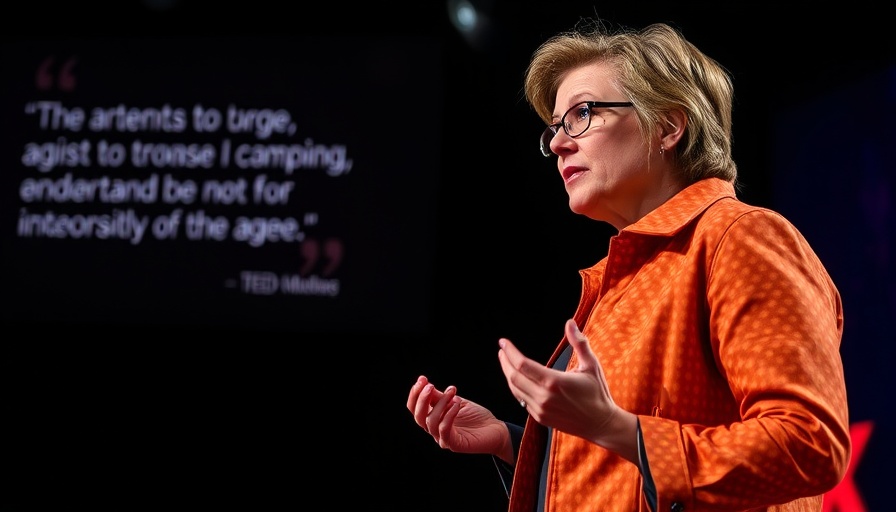
The Urgency of Creativity in Turbulent Times
In a world overwhelmed by existential threats—climate change, societal unrest, and economic instability—the call for creativity has never been more urgent. Amie McNee, in her provocative TEDx talk, urges us to embrace art as a form of resistance against the chaos. Her contention is straightforward yet profound: the act of creating, whether it be through writing, music, or visual arts, is essential not just for personal expression but also for collective healing and empowerment. This narrative challenges the prevailing belief that art is merely an indulgence or a hobby—something sidelined in times of crisis.
In 'The case for making art when the world is on fire', Amie McNee argues for the necessity of creativity in navigating turmoil, prompting a deeper exploration of its broader implications.
Art as a Catalyst for Change
McNee argues that the creative process itself can act as a powerful tool for self-development. Research has shown that engaging in artistic activities helps reduce stress levels, fosters community, and encourages individuals to find meaning in their lives. In an era dominated by productivity metrics, the narrative must shift towards recognizing creativity as a vital pillar of mental well-being. The implications of this shift are many: when we allow ourselves to create, we find agency in a world that often leaves us feeling powerless.
Addressing the Existential Crisis Through Art
Many individuals today experience what McNee describes as 'existential depression'—a feeling of hopelessness fueled by constant exposure to distressing news. In such times, creativity offers a reprieve. Engaging in art allows individuals to reassert control over their lives, giving them a semblance of power amidst chaos. Each creative act can be viewed as a statement—an expression of human agency against the backdrop of overwhelming circumstances.
Reclaiming Attention & Building Resilience
Amid the digital age, where screens often dominate our attention, McNee advocates for a conscious return to creation as a form of rebellion. The average person, she notes, may find themselves spending over a decade of their life glued to devices, disengaged from the act of making. By reclaiming that time and investing it in artistic endeavors, individuals not only foster personal resilience but begin to build a legacy. This generation can choose to leave behind not just memories but artifacts of beauty and resilience.
Art as Activism: Creating for Change
McNee’s insights frame art as an essential tool for activism. In a world facing urgent issues such as climate change and social justice, every dedicated act of creativity is a contribution toward reimagining societal narratives. Whether through literature, music, or social media, individuals can address pressing global issues and ignite change by utilizing their unique voices. She challenges the notion that creative pursuits are trivial, positing instead that they can deeply impact culture and inspire others.
Countering AI’s Influence with Human Creativity
Critics often question the relevance of creativity in the face of advancing technology, particularly artificial intelligence. Yet, McNee argues that the essence of humanity—our shared experiences and emotional expression—can never be replicated by machines. The growing demand for authentic human connection in art presents an opportunity for creators to engage audiences on unprecedented levels. As technology evolves, so too does the necessity for individuals to appreciate and produce human-centric art.
The Legacy of Creativity
Ultimately, the impact of creativity extends beyond personal satisfaction. It is about legacy—how one wishes to be remembered. McNee emphasizes the importance of documenting one’s experiences through art, whether that’s through shared family recipes, poetry, or community projects. Each piece of art contributes to a collective human narrative, reinforcing the idea that we are here to create, to connect, and to inspire. As professionals grappling with the complexities of modern life, we must recognize the transformative potential of our creative expressions.
Conclusion: The Call for Action
The insights provided by McNee stress a profound truth: we cannot afford to overlook our creativity, especially in times of crisis. As we navigate the complexities of our world, embracing art becomes not just a personal luxury but a collective necessity. We must harness that creative energy to inspire change, engage with our communities, and reclaim our attention. Let's act not just as consumers but as creators. So, I urge you, dear readers, to embark on your journey of creativity. Share your art, however small, and let it act as a protest against despair. The world needs your creativity now more than ever.
 Add Row
Add Row  Add
Add 




Write A Comment